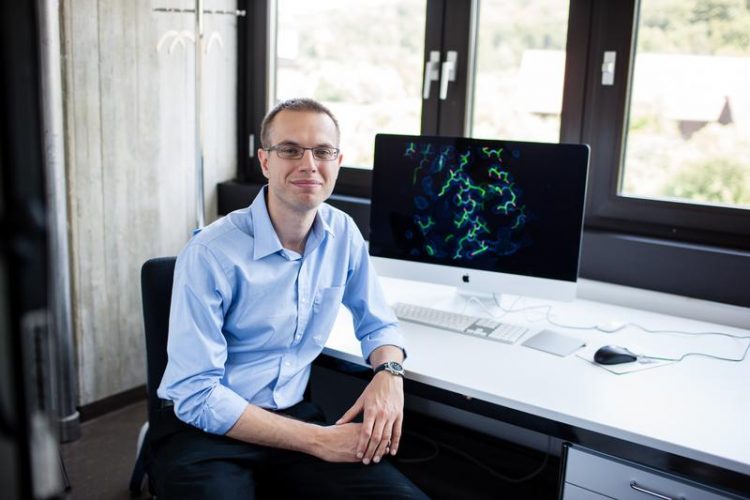Martin Jinek wins Vallee Young Investigator Award

Martin Jinek was presented with the 2015 Vallee Young Investigator Award for his successful research in biomedicine. UZH
Professor Martin Jinek’s main research interest is a sophisticated bacterial mechanism known as the CRISPR system that has recently been developed into a powerful genetic engineering technology.
His latest research work revealed precisely how the system works and which components are involved, right down to atomic level. These findings open up new possibilities for a targeted application in gene therapy to cure hereditary diseases.
35-year-old Martin Jinek studied at the University of Cambridge, and obtained a doctorate in Heidelberg, Germany. Following several years of postdoctoral research work in Berkeley, California, he joined the Department of Biochemistry at the University of Zurich two years ago.
Professor Jinek’s successful research has already been recognized with publications in renowned journals and various prizes. In 2013, for instance, he received a prestigious Starting Grant from the European Research Council (ERC), as well as the 2014 John Kendrew Award from the European Molecular Biology Laboratory (EMBL) in Heidelberg. In addition, Professor Jinek was awarded this year’s Friedrich Miescher Prize – one of Switzerland’s highest accolades for young investigators.
Vallee Young Investigator Award
Every year, the Vallee Foundation, Boston, presents the Vallee Young Investigator Award to young scientists for outstanding research work in biomedicine. The key factors for the prize include the originality, innovation, quality and independence of the research. The USD 250,000 in prize money is meant to be used for basic research.
http://www.mediadesk.uzh.ch/articles/2015/martin-jinek-mit-vallee-young-investig…
Media Contact
All latest news from the category: Awards Funding
Newest articles

A universal framework for spatial biology
SpatialData is a freely accessible tool to unify and integrate data from different omics technologies accounting for spatial information, which can provide holistic insights into health and disease. Biological processes…

How complex biological processes arise
A $20 million grant from the U.S. National Science Foundation (NSF) will support the establishment and operation of the National Synthesis Center for Emergence in the Molecular and Cellular Sciences (NCEMS) at…

Airborne single-photon lidar system achieves high-resolution 3D imaging
Compact, low-power system opens doors for photon-efficient drone and satellite-based environmental monitoring and mapping. Researchers have developed a compact and lightweight single-photon airborne lidar system that can acquire high-resolution 3D…





















